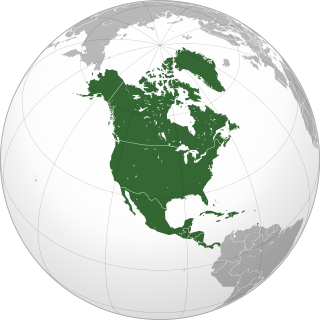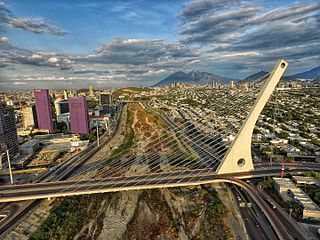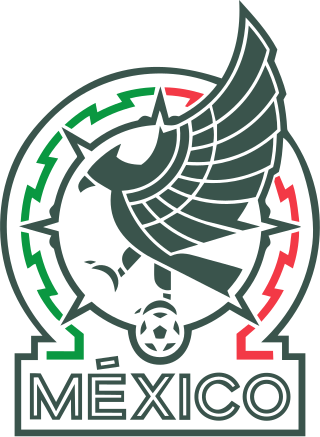Related Research Articles

Mexico City is the capital and largest city of Mexico, and the most populous city in North America. It is one of the most important cultural and financial centers in the world. Mexico City is located in the Valley of Mexico within the high Mexican central plateau, at an altitude of 2,240 meters (7,350 ft). The city has 16 boroughs or demarcaciones territoriales, which are in turn divided into neighborhoods or colonias.

North America is a continent in the Northern and Western Hemispheres. North America is bordered to the north by the Arctic Ocean, to the east by the Atlantic Ocean, to the southeast by South America and the Caribbean Sea, and to the west and south by the Pacific Ocean. The region includes the Bahamas, Bermuda, Canada, the Caribbean, Central America, Clipperton Island, Greenland, Mexico, Saint Pierre and Miquelon, the Turks and Caicos Islands, and the United States.

New Mexico is a state in the Southwestern region of the United States. It is one of the Mountain States of the southern Rocky Mountains, sharing the Four Corners region with Utah, Colorado, and Arizona. It also borders the state of Texas to the east and southeast, Oklahoma to the northeast, and shares an international border with the Mexican states of Chihuahua and Sonora to the south. New Mexico's largest city is Albuquerque, and its state capital is Santa Fe, the oldest state capital in the U.S., founded in 1610 as the government seat of Nuevo México in New Spain.

Monterrey is the capital and largest city of the northeastern state of Nuevo León, Mexico, and the ninth-largest city and second largest metro area in Mexico behind Greater Mexico City. Located at the foothills of the Sierra Madre Oriental, Monterrey is a major North American business and industrial hub, as well as the most populous city in northern Mexico.

Albuquerque, also known as ABQ, Burque, the Duke City, and in the past 'the Q', is the most populous city in the U.S. state of New Mexico. Founded in 1706 as La Villa de Alburquerque by Santa Fe de Nuevo México governor Francisco Cuervo y Valdés, and named in honor of Francisco Fernández de la Cueva, 10th Duke of Alburquerque and Viceroy of New Spain, it served as an outpost on El Camino Real linking Mexico City to the northernmost territories of New Spain.

Guadalajara is a city in western Mexico and the capital of the state of Jalisco. According to the 2020 census, the city has a population of 1,385,629 people, making it the 8th most populous city in Mexico, while the Guadalajara metropolitan area has a population of 5,268,642 people, making it the third-largest metropolitan area in the country and the twenty-second largest metropolitan area in the Americas. Guadalajara has the second-highest population density in Mexico, with over 10,361 people per square kilometer. Within Mexico, Guadalajara is a center of business, arts and culture, technology and tourism; as well as the economic center of the Bajío region. It usually ranks among the 100 most productive and globally competitive cities in the world. It is home to numerous landmarks, including Guadalajara Cathedral, the Teatro Degollado, the Templo Expiatorio, the UNESCO World Heritage site Hospicio Cabañas, and the San Juan de Dios Market—the largest indoor market in Latin America.

El Paso is a city in and the county seat of El Paso County, Texas, United States. The 2020 population of the city from the U.S. Census Bureau was 678,815, making it the 22nd-most populous city in the U.S., the most populous city in West Texas, and the sixth-most populous city in Texas. Its metropolitan statistical area covers all of El Paso and Hudspeth counties in Texas, and had a population of 868,859 in 2020.
The Mexican peso is the official currency of Mexico. The peso was first introduced in 1863, replacing the old Spanish colonial real. The Mexican peso is subdivided into 100 centavos, represented by "¢". Mexican banknotes are issued by the Bank of Mexico in various denominations and feature vibrant colors and imagery representing Mexican culture and history. Modern peso and dollar currencies have a common origin in the 16th–19th century Spanish dollar, most continuing to use its sign, "$".

Magdalena Carmen Frida Kahlo y Calderón was a Mexican painter known for her many portraits, self-portraits, and works inspired by the nature and artifacts of Mexico. Inspired by the country's popular culture, she employed a naïve folk art style to explore questions of identity, postcolonialism, gender, class, and race in Mexican society. Her paintings often had strong autobiographical elements and mixed realism with fantasy. In addition to belonging to the post-revolutionary Mexicayotl movement, which sought to define a Mexican identity, Kahlo has been described as a surrealist or magical realist. She is also known for painting about her experience of chronic pain.

Cancún is the most populous city in the Mexican state of Quintana Roo, located in southeast Mexico on the northeast coast of the Yucatán Peninsula. It is a significant tourist destination in Mexico and the seat of the municipality of Benito Juárez. The city is situated on the Caribbean Sea and is one of Mexico's easternmost points. Cancún is located just north of Mexico's Caribbean coast resort area known as the Riviera Maya.

The United States men's national soccer team, abbreviated as USMNT, represents the United States in men's international soccer competitions. The team is governed by the United States Soccer Federation, which is a member of FIFA since 1914 and was a founding member of CONCACAF since 1961. It was also affiliated with NAFC, which was a predecessor confederation of CONCACAF and the governing soccer body in North America from 1946 to 1961.

Andrés Manuel López Obrador, also known by his initials AMLO, is a Mexican politician who served as the 65th president of Mexico from 2018 to 2024. He previously served as Head of Government of Mexico City from 2000 to 2005.

The Mexico national football team represents Mexico in men's international football and is governed by the Federación Mexicana de Fútbol. It has been a member of FIFA since 1929 and competes as a member of CONCACAF since 1961, of which it was one of the founding members. It was also a member of NAFC from 1946 to 1961, which was a predecessor confederation of CONCACAF and the governing body of football in North America at the time.

Club de Fútbol América S.A. de C.V., commonly known as Club América, is a professional football club based in Mexico City. Nicknamed Las Águilas, it competes in Liga MX, the top tier of Mexican football. The club was founded in 1916, and since 1959 has been owned by mass media company Televisa. The team plays its home games at Estadio Azteca, the largest stadium in Latin America and one of the largest in the world.
Miguel Ángel López Díaz was a Mexican professional wrestler and trainer, better known by his ring name, Rey Misterio. He was also referred to as Rey Misterio Sr. to distinguish him from his nephew.

Mexico, officially the United Mexican States, is a country in the southern portion of North America. Covering 1,972,550 km2, it is the world's 13th largest country by area; with a population of over 130 million, it is the 10th most populous country and has the most Spanish speakers in the world. Mexico is a constitutional republic comprising 31 states and Mexico City, its capital and largest city, which is among the world's most populous metropolitan areas. The country borders the United States to the north; as well as Guatemala and Belize to the southeast. It has maritime borders with the Pacific Ocean to the west, the Caribbean Sea to the southeast, and the Gulf of Mexico to the east.

Joaquín Archivaldo Guzmán Loera, commonly known as "El Chapo", is a Mexican former drug lord and a former leader within the Sinaloa Cartel. Guzmán is believed to be responsible for the deaths of over 34,000 people, and was considered to be the most powerful drug trafficker in the world until he was extradited to the United States and sentenced to life in prison.

The Mexican drug war is an ongoing asymmetric armed conflict between the Mexican government and various drug trafficking syndicates. When the Mexican military intervened in 2006, the government's main objective was to reduce drug-related violence. The Mexican government has asserted that their primary focus is dismantling the cartels and preventing drug trafficking. The conflict has been described as the Mexican theater of the global war on drugs, as led by the United States federal government.

Santa Fe is the capital of the U.S. state of New Mexico, and the county seat of Santa Fe County. With over 89,000 residents, Santa Fe is the fourth-most populous city in the state, and part of the Albuquerque–Santa Fe–Los Alamos combined statistical area, which had a population of 1,162,523 in 2020. Situated at the foothills of the Sangre de Cristo Mountains, the city is at the highest altitude of any U.S. state capital, with an elevation of 6,998 feet.

The Mexican–American War, also known in the United States as the Mexican War, and in Mexico as the United States intervention in Mexico, was an invasion of Mexico by the United States Army from 1846 to 1848. It followed the 1845 American annexation of Texas, which Mexico still considered its territory because it refused to recognize the Treaties of Velasco, signed by President Antonio López de Santa Anna after he was captured by the Texian Army during the 1836 Texas Revolution. The Republic of Texas was de facto an independent country, but most of its Anglo-American citizens who had moved from the United States to Texas after 1822 wanted to be annexed by the United States.
References
- ↑ "Perfil del legislador". Legislative Information System. Retrieved 20 December 2014.